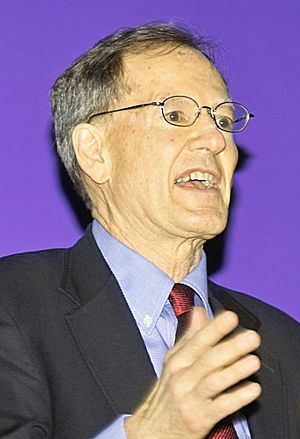George Gilder facts for kids
Quick facts for kids
George Franklin Gilder
|
|
|---|---|

Gilder in April 2005
|
|
| Born | November 29, 1939 New York City, U.S.
|
| Education | Harvard University (BA) |
| Occupation | Author and Economist |
| Known for |
|
|
Notable work
|
Wealth and Poverty |
| Title |
|
| Spouse(s) |
Cornelia (Nini) Ewing Brooke
(m. 1976) |
| Parents |
|
| Relatives |
|
| Military career | |
| Allegiance | |
| Service/ |
|
| Signature | |
 |
|
George Franklin Gilder (born November 29, 1939) is an American writer, investor, and economist. He is known for his influential book Wealth and Poverty, which supported ideas about capitalism (an economic system where private companies and people own most businesses) and supply-side economics. He also co-founded the Discovery Institute, a non-profit organization.
Contents
Early Life and Schooling
George Gilder was born in New York City. His father, Richard Watson Gilder II, was a pilot in the United States Army Air Forces during World War II and died in the war when George was only two. His great-grandfather was the famous designer Louis Comfort Tiffany.
Gilder grew up on a dairy farm in Tyringham, Massachusetts, with his mother, Anne, and his stepfather, Gilder Palmer. His godfather was David Rockefeller, a member of the famous Rockefeller family.
For his education, Gilder went to top schools, including Phillips Exeter Academy and Harvard University. He graduated from Harvard in 1962. He later returned to Harvard to study politics.
Military Service
Gilder served in the United States Marine Corps.
Career
Gilder has had a long career as a writer and thinker, focusing on politics, economics, and technology.
Writing for Politicians
In the 1960s, Gilder worked as a speechwriter. He wrote speeches for famous politicians like Nelson Rockefeller, George W. Romney, and Richard Nixon.
Early in his career, he and his college friend Bruce Chapman wrote a book called The Party That Lost Its Head. Years later, Gilder said he had changed his mind about the ideas in that book. He wrote that the people he once called "extremists" were actually right about many important issues.
Ideas on Economics
Gilder became a strong supporter of an idea called supply-side economics. This theory suggests that the best way to help the economy grow is to lower taxes on people and businesses. The idea is that with more money, people will invest and create new jobs, which helps everyone.
He explained these ideas in his most famous book, Wealth and Poverty, published in 1981. The book became a bestseller and was very popular when Ronald Reagan was president. It argued that capitalism is not just practical but also moral because it starts with people creating things of value.
Focus on Technology
In the 1990s, Gilder became very interested in technology and the internet. He wrote several books about how new inventions would change the world.
- Life After Television (1990): In this book, he predicted that powerful little computers connected by fiber optic cables would replace traditional television. This was an early vision of how the internet and personal computers would work.
- Microcosm: This book was about the revolution in computer chips.
- Telecosm: This book explored the future of fiber optics, the tiny glass cables that carry internet data.
- The Silicon Eye: This book was about a special kind of digital camera sensor.
Gilder also invests in technology companies and is the chairman of an advisory board for an Israeli tech company called ASOCS.
Views on Society
In the 1970s, Gilder wrote a book called Men and Marriage. His views on the roles of men and women in society caused a lot of debate. He appeared on TV shows like Firing Line and The Dick Cavett Show to discuss his ideas, which were often met with strong disagreement from the audience.
Intelligent Design
In 1991, Gilder and Bruce Chapman co-founded the Discovery Institute. At first, the group focused on local issues in Seattle. Later, it became the main organization supporting the idea of intelligent design.
Intelligent design suggests that certain features of the universe and of living things are best explained by an intelligent cause, not an undirected process such as natural selection. Gilder has written many articles supporting intelligent design and questioning the theory of evolution.
 | Sharif Bey |
 | Hale Woodruff |
 | Richmond Barthé |
 | Purvis Young |

